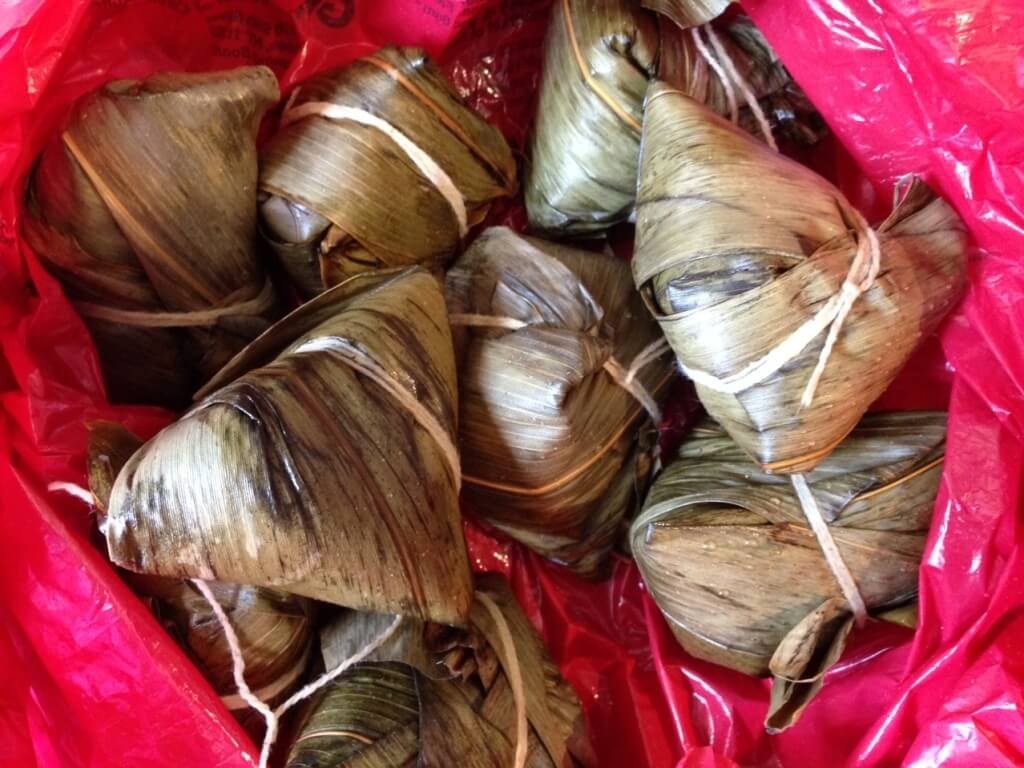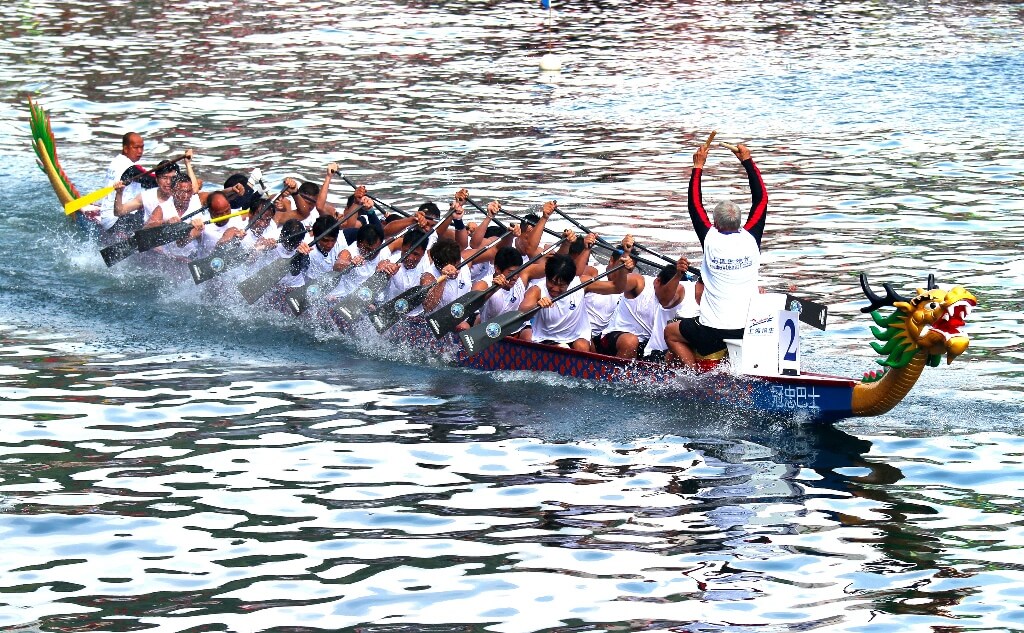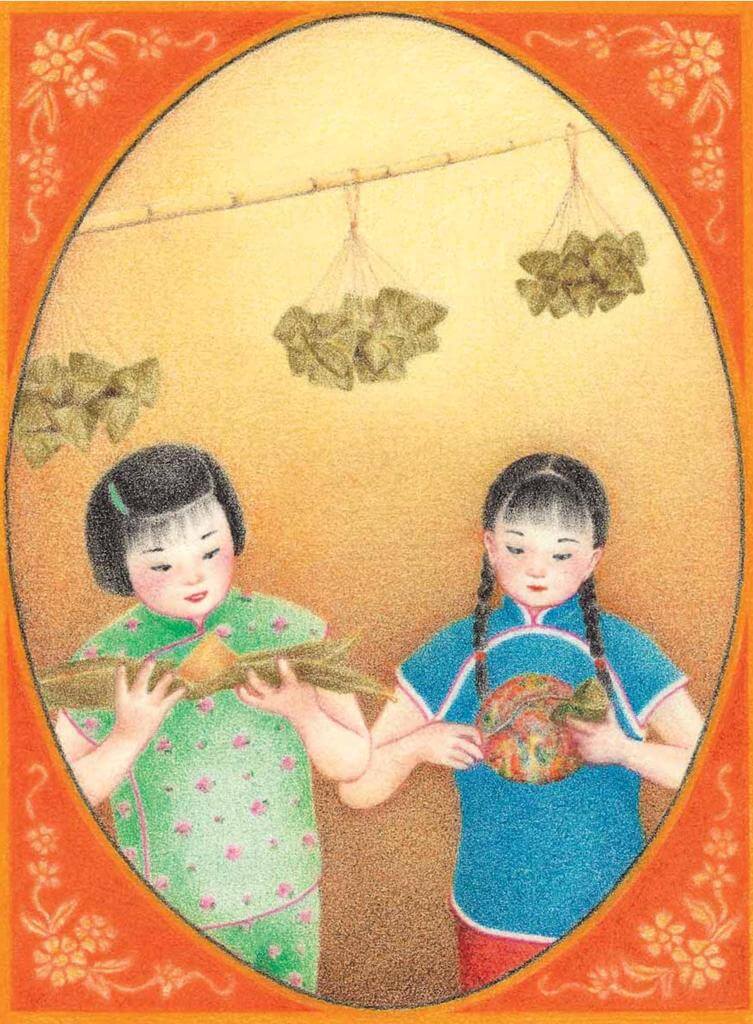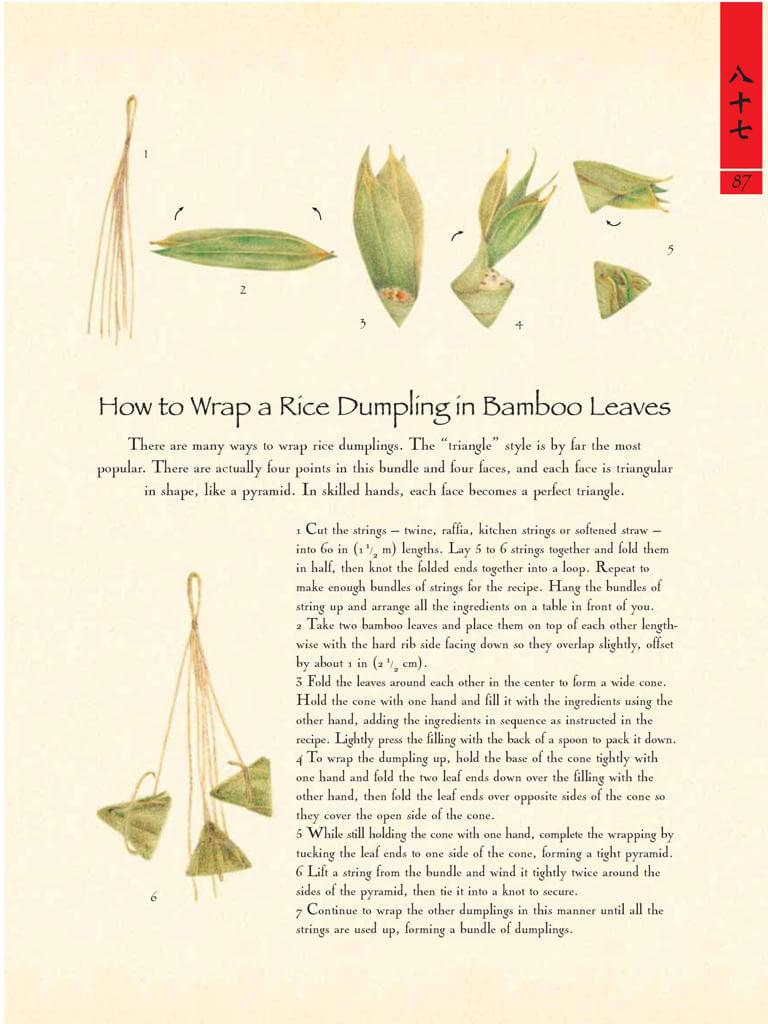19 Jun / Glutinous Rice Dumplings and the Dragon Boat Festival


Oarsmen rowing earnestly to the beat of the drum during a dragon boat race in Hong Kong. Photo credit: eLjeProks, flickr.com, CC
I have vivid memories of the annual dragon boat festival, also called Duan Wu Jie (端午节) or Double Fifth Festival (because it occurs on the 5th day of the 5th month of the traditional lunar calendar). Most of the time, we watched the dragon boat races (the main event) on television, and perhaps once or twice we braved the crowds and watched it live down by the Singapore River.
I can still recall the thrill of watching men (and sometimes women) plunge their oars into the water, a white, foamy wake lining their brightly painted boats skimming down the river. My heart would jump with every pound of the drum, the rhythm of the drumbeats synchronizing the oarsmen as they rowed.
Even though we didn’t watch the races every year, my mom would make glutinous rice dumplings without fail. The dumplings are called zongzi (粽子) in Mandarin, chung in Cantonese. We called them bacang (pronounced “bah-chung”) which I believe is similar to the Hokkien or Taiwanese name (ba-tzang) for them.

My friend Diana dropped off a bag of zongzi she made in the Hokkien (Fukienese)-style with pork, mushrooms and chestnuts.
Other Asian countries such as Vietnam, Japan and Korea celebrate the dragon boat festival in their own ways and have their own versions of rice dumplings as part of their shared cultural heritage.
The making and eating of zongzi started as a custom to commemorate the poet and great scholar Qu Yuan (c. 340–278 BC). Qu Yuan was slated for high office in the Chu imperial court during the Warring States period of the Zhou Dynasty but alas, he fell from favor and was banished. During his exile, he wrote many poems, many of which are considered literary masterpieces today.
When the Chu Kingdom fell to the Qin, Qu Yuan was so devasted he drowned himself in the Miluo River on the fifth day of the fifth month.
Word soon spread that the poet had fallen into the river, and people rushed out in boats to look for him, beating drums and gongs to frighten the fish away (who doesn’t love the romantic notion of a poet killing himself for his country?).
When Qu Yuan’s body could not be found, the people threw rice-filled bamboo stems into the river to feed his hungry spirit as well as to distract the fish so they wouldn’t eat his body. That, my friends, is how the tradition of dragon boat racing and rice dumplings came to be.
Today, the dumplings come in many variations from pyramidal shapes wrapped with bamboo and banana leaves, as well as lotus leaf-wrapped “pillows.” Fillings include pork belly, mushrooms, chestnuts, salted eggs, and mung beans. Plain rice dumplings are also served with a sweet coconut syrup.
Zongzi used to be only eaten once a year during this festival but they are now available year-round, especially at dim sum restaurants.
My mom now makes bacang several times a year, whenever she or her friends are struck with a craving. Her filling is sweet and savory (using kecap manis) and she sometimes uses regular rice instead of glutinous rice, but probably because that’s all she has in the pantry (my mom is resourceful/thrifty that way!).

This delightful illustration of two girls eating zongzi is from “Chinese Feasts & Festivals”–one of many!
Coincidentally, a friend dropped off a batch of zongzi she made a couple of weeks ago. This spurred me on to look for a recipe and I found what I was looking for in Chinese Feasts and Festivals by S.C. Moey (Periplus Editions, 2006). In addition to wonderful stories behind numerous festivals, the book includes many traditional festival favorites like mooncakes and sweet rice balls, as well as lovely illustrations by the author. It’s a must for anyone interested in Chinese culture and history.

A step-by-step illustration of how to wrap rice dumplings from “Chinese Feasts & Festivals.” Please refer to it when you make the dumplings below.
~~~
COOKBOOK GIVEAWAY
To celebrate the Dragon Boat Festival, Tuttle Publishing is giving away a copy of Chinese Feasts and Festivals. To enter, please subscribe to the Pickles and Tea blog (scroll down to the very bottom!) and tell us about your favorite Asian festival and/traditional food in the comments section below. We’ll randomly select a winner and post the results after the deadline.
Last day to enter: Friday, July 10th, 2015.
Sorry, but we can only mail to U.S. and Canadian addresses.
~~~
Disclosure: I was given a complimentary copy of Chinese Feasts & Festivals, however, all opinions are my own!
~~~
[yumprint-recipe id=’12’]





In high school one of my friends gave me a moon cake for the moon festival. The egg yolk inside was a happy surprise.
Chinese New Year. Usually the best food spread for the year! Steamboat, roast meats, waxed meat, pen cai and many many more!
my favorite holiday would be the Mid-Autumn Harvest (Moon) festival! I love mooncakes! I like it as it is most like our Thanksgiving,focusing on family and thankful hearts <3
On Christmas, it’s traditional for Jewish families in the US to eat Chinese food. I am Jewish and don’t cook. But I have long shared a house with a dear friend who is Filipino-American, and he loves to cook all our holiday meals. He makes all Asian cuisines, but for Christmas he goes all out with ma po tofu and kung pao chicken.
And the winner is … Teri P! Congratulations! Thanks to everyone for participating!